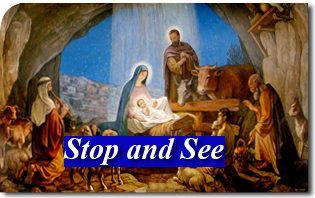
I could not resist. My original intention was to write about some other theme, such as the internal crisis of the Church, but I felt that there were no conditions for such a subject either in myself or in those around me.
At the same time, as if from the depth of my soul, harmonious and soothing reminiscences of my Christmases of old, made themselves felt within me, and I am sure many of my readers share this same state of spirit.
To encourage our exhausted and desolated souls, let us unveil the light of Christmas for a moment so that afterwards we may again resume our almost unbearable tedium with greater fortitude.
* * *
Let it be well understood that I do not speak of the propagandistic and inauthentic joys which dominate the feast of Christmas in our days. These have assumed the characteristics of a mere commercial function, with agitated propaganda that barely allows people the peace of mind not to shop.
“Glory to God in the Highest and peace on Earth to men of good will.” How this angelic canticle found a fertile environment in those desolate fields of Bethlehem, in the upright hearts of the shepherds awakened from their deep and tranquil sleep. And, in contrast, how these angelic words seem strange and without resonance or affinity in the thoughts of man obsessed with material things in our modern cities.
Has the authentic Christmas died?
With a touch of exaggeration, one could say that it has. It has died in the virtually robot-like souls of so many millions of men. And one may even say that it has perished in certain Nativity scenes as well. Yes, Christmas has also died in the progressivist Nativities designed by modern art, portraying the Holy Family with deformed features and creating impressions that incite social revolution.
 Learn All About the Prophecies of Our Lady of Good Success About Our Times
Learn All About the Prophecies of Our Lady of Good Success About Our Times
If we exaggerate in saying that Christmas has died, it is certainly true that it still preserves some rays of life. If such be the case, let us search for these rays.
Before anything else, we will find them in the very fact of it being Christmas Day. We see that each liturgical feast brings with it an effusion of special graces. Whether men appreciate it or not, grace knocks at the door of each soul, and it does so more sublimely, lovingly, and insistently on Christmas Day. It can be said that, in spite of everything, a light hovers in the air, a certain peace, an encouragement to our souls, a force of idealism and dedication that is difficult to ignore.
Moreover, in certain churches and in many households the authentic Nativity still presents to our souls an image of the Infant God, Who came to break the bonds of death, to trample upon sin, to forgive, to regenerate, to open to men new and unlimited possibilities for virtue and goodness.
Behold God, compassionate and within our reach, made man like us, having next to Him the perfect mother, His mother but also ours. Through her, even the worst of sinners may ask and hope to receive everything.
It is a feast in which our happiness at having faith and virtue shines, and in which we rejoice at having all our actions and possessions placed in a sacral order.
The joy of Christmas? Yes, but much more than this. For a true Catholic, it is also the joy of all 365 days of the year. For in those souls in which Our Divine Savior dwells by the work of grace, this joy lasts forever and is never extinguished. Neither pain, nor struggle, nor illness, nor even death can eliminate it.
O you who live greedily for gold, O you who live totally for vain glory, O you who live torpidly for sensuality, O you who live diabolically for revolt and for crime, STOP AND SEE those souls who are genuinely Catholic, over whom shines the joy of Christmas, and ask yourselves what your happiness is in comparison to theirs?
Do not take these words as provocation nor disdain, for in fact, they are more than this.
They constitute an invitation for a perennial Christmas, which is the life of the true faithful: “Christianus alter Christus,” the Christian is another Jesus Christ.
There is no happiness equal to this, not even when the Catholic finds himself, like Jesus Christ Our Lord, nailed to the Cross.
The preceding article was originally published in the Folha de S.Paulo, on December 27, 1970. It has been translated and adapted for publication without the author’s revision. –Ed.
